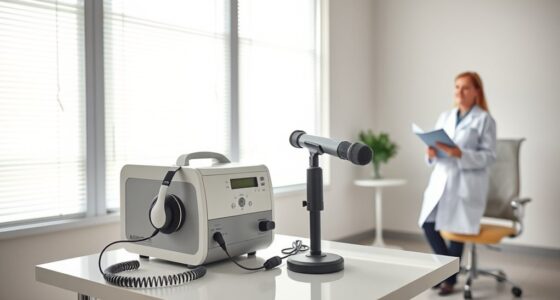The VA has expanded coverage for hearing aids and implants, making it easier for you to access advanced hearing devices and care. This new policy reduces costs and broadens eligibility, so more veterans can benefit from the latest technology. It streamlines the application process and offers better support for those with service-related hearing loss. To discover how these changes can help you, explore the details that follow.
Key Takeaways
- The VA now covers a broader range of hearing aids and implantable devices for eligible veterans.
- Coverage includes advanced digital hearing aids, cochlear implants, and bone-anchored systems.
- Eligibility requirements now broaden access, including more veterans with service-connected hearing loss.
- Financial benefits have increased, reducing out-of-pocket costs for hearing devices and related care.
- The policy improvements aim to improve hearing health, device quality, and streamline access to services.
Overview of the New Coverage Policy

The VA has announced a significant update to its coverage policy, now including broader access to hearing aids and implants for eligible veterans. This change aims to improve hearing health and quality of life. Veterans can now receive coverage that includes more advanced devices and follow-up care, reducing out-of-pocket costs. With this expansion, you’re encouraged to stay proactive with hearing aid maintenance to ensure peak performance and longevity. Veteran support groups can be valuable resources, providing guidance on device care and sharing experiences. The new policy also streamlines the application process, making it easier to access these services. Additionally, understanding sound quality and proper device calibration can significantly impact the effectiveness of hearing aids and implants. Regular check-ups and device maintenance are essential for optimal function and long-term satisfaction with your hearing devices. Incorporating technological advancements can further enhance the performance of hearing aids and implants over time. Staying informed about hearing health options and innovations can help veterans make the most of their new coverage. This comprehensive approach aligns with the broader goal of systematic security assessments to protect and optimize healthcare services for veterans. Overall, the VA’s expanded coverage reflects a commitment to supporting veterans’ hearing needs and enhancing their well-being.
Types of Hearing Devices Included in the Expansion
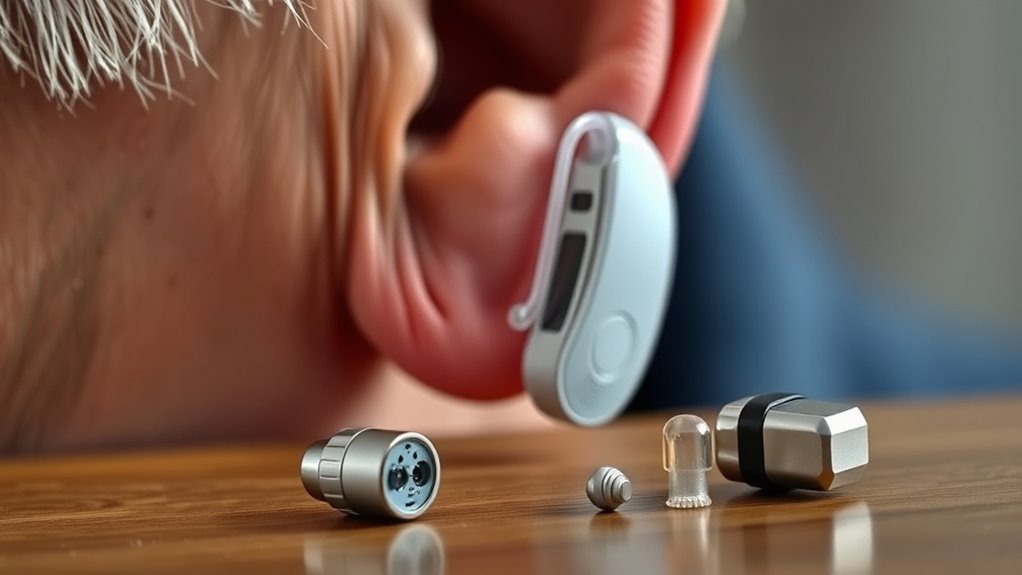
As part of the expansion, the VA now covers a wider range of hearing devices, including both traditional and advanced options. You can access various hearing aid technology, from basic behind-the-ear models to sophisticated digital devices that improve sound clarity. The expansion also includes different implant types, such as cochlear implants and bone-anchored hearing systems, which are suitable for those with more severe hearing loss. These devices use cutting-edge technology to deliver better sound quality and comfort. Whether you need a simple hearing aid or a more complex implant, this expanded coverage guarantees you have access to the latest options. This means you no longer have to worry about affordability when seeking the most effective hearing solutions available. Healthcare advancements continue to advance in the healthcare sector, enhancing the effectiveness of medical devices, including hearing device technology. Additionally, ongoing research into patient-centered care ensures that these devices are tailored to meet individual needs and improve overall quality of life. Recognizing the importance of air quality in health, the VA also emphasizes the significance of maintaining optimal environments for better overall well-being.
Eligibility Requirements for Veterans

Veterans can qualify for expanded hearing aid and implant coverage by meeting specific eligibility criteria set by the VA. Your benefits eligibility depends on factors like service-connected disabilities, length of service, and current health status. To determine if you qualify, review the veteran qualifications listed below:
| Criteria | Requirements | Notes |
|---|---|---|
| Service-connected disability | Must be linked to hearing loss | Verified through VA medical records |
| Duration of service | Minimum active duty period | Varies by program |
| Prior hearing aid use | Previous device usage recommended | Not always mandatory |
| Enrollment status | Enrolled in VA healthcare | Required for coverage |
Meeting these criteria guarantees you’re eligible for the expanded hearing benefits. Additionally, understanding the eligibility criteria helps ensure you access all available support. The expanded coverage can significantly improve your quality of life, so it’s important to stay informed about your options. Knowing the benefits of coverage can help veterans make informed decisions about their healthcare options. Being aware of additional benefits can further enhance your veteran healthcare experience. Proper documentation and awareness of VA policies are essential for a smooth claims process.
Financial Benefits and Cost Reductions
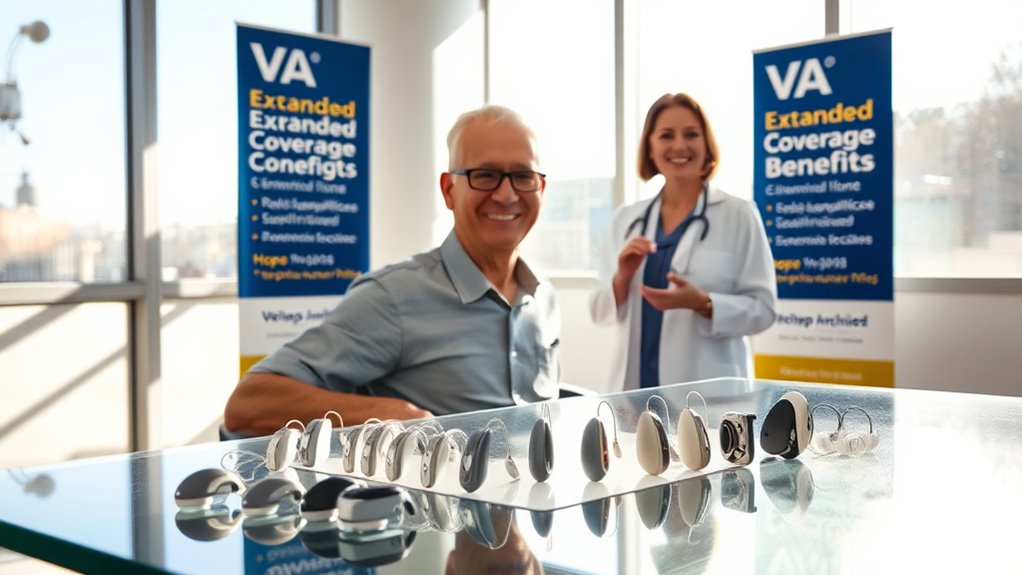
You can receive significant financial benefits and enjoy reduced costs when obtaining hearing aids and implants through the VA. The expanded coverage helps you save money with substantial cost savings on devices and procedures. The VA offers financial assistance programs that can cover a large portion of your expenses, making hearing healthcare more affordable. These benefits reduce your out-of-pocket costs, easing the financial burden often associated with hearing aids and implants. By taking advantage of VA coverage, you guarantee access to necessary technology without stressing your budget. This support is designed to make hearing improvement options accessible and affordable, so you can focus on your health without worrying about high costs. Overall, the VA’s expanded coverage provides meaningful financial relief for eligible veterans.
Impact on Veterans’ Healthcare Access
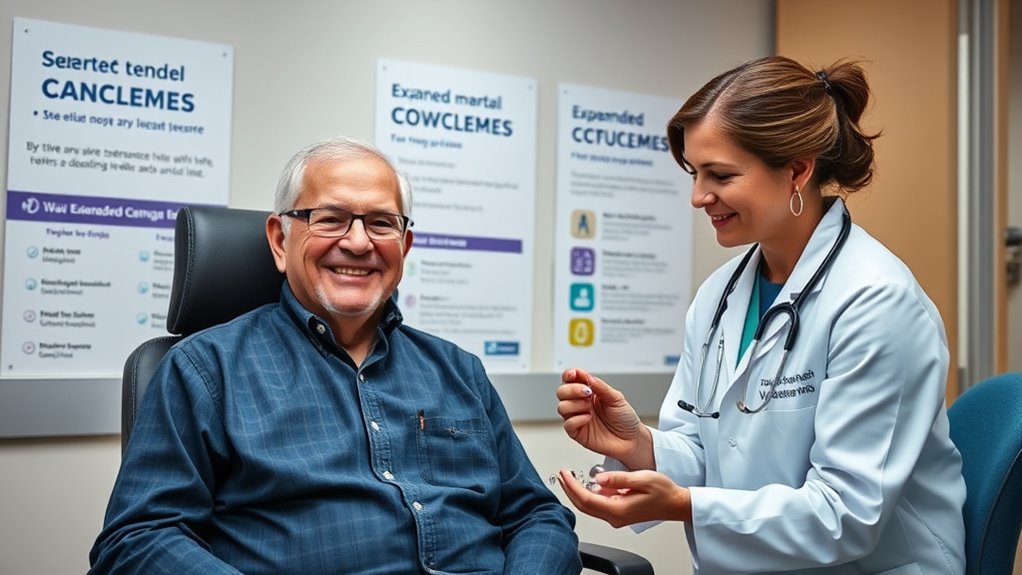
With expanded coverage, your access to effective hearing treatments improves considerably. You’ll face lower out-of-pocket costs, making it easier to get the care you need. This change can lead to a better quality of life by addressing hearing issues more promptly and reliably. Additionally, understanding the divorce process can help you navigate complex legal procedures effectively should your circumstances change. Recognizing the importance of hearing aid tuning and customization can further optimize your device’s performance and comfort. Leveraging essential resources and tips for caregivers and seniors can also assist veterans in accessing timely information and support resources.
Improved Hearing Treatment Access
Thanks to the VA’s expanded coverage for hearing aids and implants, access to hearing treatment has considerably improved for many veterans. This change enhances overall hearing health, making it easier for you to receive timely care without financial barriers. This initiative also emphasizes exfoliation benefits, ensuring that veterans can access comprehensive care for their ear and skin health. You no longer have to wait for referrals or worry about out-of-pocket costs, which often delayed treatment. The VA’s focus on veteran advocacy ensures that your hearing needs are prioritized, helping you maintain better communication and quality of life. With these new options, you can seek exhaustive care more confidently, knowing that the VA is committed to supporting your hearing health. As a result, more veterans are now able to access the treatments they need, leading to improved well-being and everyday functioning. Data privacy concerns continue to shape how healthcare providers manage sensitive information in these expanded services. Additionally, ongoing efforts to improve healthcare data security are vital to protect veterans’ personal information, especially as AI technology becomes more integrated into healthcare solutions. Furthermore, the expansion reflects a broader commitment to comprehensive veteran care, ensuring that hearing health is an integral part of overall wellness initiatives.
Reduced Out-of-Pocket Costs
The VA’s expanded coverage not only improves access to hearing aids and implants but also substantially reduces out-of-pocket expenses for veterans. With improved coverage enhancements, you’ll experience less financial strain during treatment, making hearing care more affordable. This change means you benefit from increased cost sharing benefits, lowering your personal costs and removing barriers to essential treatment. To illustrate, consider the impact:
| Cost Sharing Benefits | Coverage Enhancements | Financial Relief |
|---|---|---|
| Reduced copays | More inclusive coverage | Less financial burden |
| Lower out-of-pocket costs | Expanded eligibility | Greater access to care |
| Affordable hearing aids | Better treatment options | Improved peace of mind |
This shift ensures you won’t have to choose between your health and your finances, empowering you to seek the care you deserve. Additionally, beneficial ingredients like collagen and hyaluronic acid in skincare products can enhance skin hydration and elasticity, emphasizing the importance of proper skincare routines.
Enhanced Quality of Life
Expanded access to hearing aids and implants considerably enhances your overall quality of life by enabling clearer communication and reducing social isolation. With improved assistive technology, you can more easily engage in conversations and reconnect with loved ones. Better hearing supports effective communication strategies, helping you stay active socially and professionally. This increased access means you no longer have to struggle silently or withdraw from social settings. As a result, your confidence grows, and you experience greater independence. The ability to hear clearly fosters a more fulfilling daily life, reduces frustration, and promotes mental well-being. Ultimately, expanded coverage empowers you to participate fully in everyday activities, making life more enjoyable and connected.
How to Apply for Hearing Aid Coverage

Applying for hearing aid coverage through the VA is a straightforward process. Start by scheduling an appointment with your healthcare provider or visiting your local VA medical center. You’ll need to provide proof of service and complete a benefits claim through the VA’s online portal or in person. Once approved, you can select your hearing aids and receive guidance on hearing aid maintenance. To maximize your benefits, explore veteran support programs that offer additional resources or discounts. Remember, applying early guarantees quicker access to hearing aids and related services. Keep all documentation organized, and don’t hesitate to ask VA staff for help. Your proactive approach will help you navigate the process smoothly and ensure you get the hearing solutions you deserve.
Comparison With Previous Benefits
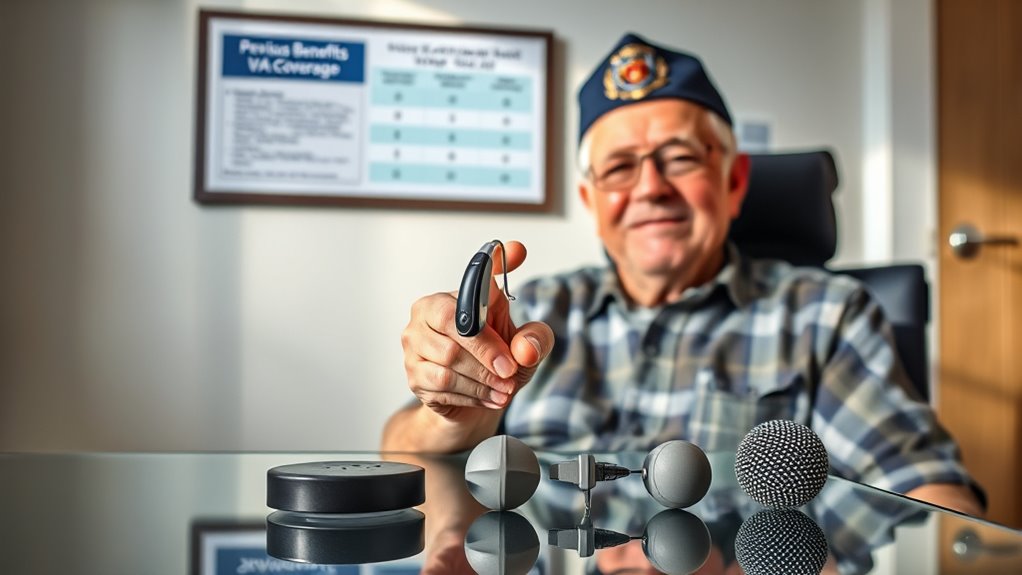
Compared to earlier benefits, the VA now offers broader coverage for hearing aids and implants, helping more veterans get the care they need. Previously, coverage was limited to specific conditions and types of devices, which left some veterans without support. This expansion considerably improves access and addresses past gaps in care.
Expanded Coverage Scope
Previously, veterans could access hearing aids and implants only under limited conditions or through specific programs, often facing strict eligibility criteria. The expanded coverage now broadens your options, allowing more veterans to benefit from advanced hearing aid technology. This change enhances veteran satisfaction by providing extensive solutions for hearing health. With the new scope, coverage includes a wider range of devices and services, reducing out-of-pocket costs and delays. You’ll have access to state-of-the-art hearing aids that improve sound clarity and comfort.
- Broader device compatibility and options
- Increased coverage for implant procedures
- Reduced waiting times and financial barriers
This expansion ensures you receive the most effective hearing solutions, tailored to your needs, and helps you stay connected and engaged in daily life.
Previous Limitations Highlighted
Before this expansion, veterans faced strict eligibility criteria that limited access to hearing aids and implants, often requiring specific conditions or participation in specialized programs. These restrictions hindered many from obtaining essential assistive technology, impacting their hearing health. Veterans had to meet narrow requirements, such as severe hearing loss or service-related injuries, which excluded those with less obvious needs. As a result, many missed out on improved communication and quality of life improvements that hearing aids and implants can provide. The previous benefits didn’t fully address the diverse needs of veterans, leaving gaps in hearing health support. This limited approach underscored the need for broader, more inclusive coverage, which the recent expansion now aims to deliver.
Additional Support Services for Veterans With Hearing Loss

To better support veterans with hearing loss, the VA now offers a range of additional services beyond hearing aids and implants. These include access to veteran support groups, which provide emotional and social assistance, and guidance on hearing aid maintenance to guarantee devices function properly. The VA also provides specialized counseling to help you adapt to hearing changes and improve communication skills. Joining veteran support groups connects you with others facing similar challenges, offering shared experiences and encouragement. Additionally, the VA offers educational resources on hearing health, helping you understand how to care for your hearing aids and manage hearing loss effectively. These thorough services aim to enhance your quality of life and ensure you receive ongoing support beyond device coverage.
Future Plans for Veteran Healthcare Improvements

The VA is committed to enhancing veteran healthcare by implementing new initiatives and expanding existing programs. Future plans focus on leveraging technological advancements to improve service delivery and outcomes. These innovations will likely influence policy implications, requiring updates to regulations and resource allocation. You can expect increased integration of telehealth, AI-driven diagnostics, and personalized treatment options. To better understand these efforts, consider this overview:
| Initiative | Technology Used | Policy Implications |
|---|---|---|
| Telehealth Expansion | Secure video platforms | Data privacy, reimbursement policies |
| AI Diagnostics | Machine learning algorithms | Training requirements, licensing adjustments |
| Personalized Treatment Plans | Data analytics and genetics | Privacy concerns, regulatory updates |
| Wearable Devices Integration | IoT sensors | Data security, device approval processes |
| Staff Training & Development | E-learning platforms | Credential standards, ongoing education policies |
Frequently Asked Questions
How Does the New Policy Affect Veterans Already Using Hearing Aids?
If you’re already using hearing aids, the new policy means you can now access hearing aid upgrades more easily and benefit from expanded veteran support programs. This change allows you to get the latest technology, improving your hearing experience. You may also find additional assistance through veteran support programs designed to help with costs and maintenance. Stay in touch with your provider to understand how these updates can best serve your needs.
Are There Any Limitations on the Types of Implants Covered?
You might wonder about implant limitations and device restrictions. Generally, the VA covers specific implant types, but there are some restrictions based on medical necessity and device compatibility. Not all implants are eligible, especially if they don’t meet safety standards or haven’t been approved for VA coverage. It’s important to consult your healthcare provider to determine if your implant falls within the covered categories and adheres to VA guidelines.
What Is the Process for Veterans With Service-Related Versus Non-Service-Related Hearing Loss?
You’ll need to determine if your hearing loss is service-related or non-service-related. For service-related issues, your compensation criteria and disability ratings help establish your eligibility for hearing aids and implants. Veterans with confirmed service-related hearing loss typically qualify for coverage, while non-service-related cases may require additional documentation. The VA reviews your medical records and conducts exams to confirm your condition’s connection to service, guiding your access to benefits accordingly.
Will Coverage Include Maintenance and Repairs for Hearing Devices?
You might wonder if hearing device warranties and repair coverage are included. Generally, coverage can extend to necessary repairs and maintenance, but it varies based on your specific situation and device. The VA often includes repair coverage for eligible veterans, helping with costs related to repairs or replacement parts. It’s best to check your policy details or consult your VA representative to confirm what’s covered under your hearing device warranty.
Are There Geographic or Regional Restrictions for Accessing These Expanded Services?
You might wonder about regional access and geographic limitations when seeking these expanded hearing aid services. Generally, your ability to access care depends on your VA facility’s location and regional programs. While the VA aims to improve coverage nationwide, some areas may have limited availability due to regional restrictions or fewer specialized providers. It’s best to check with your local VA or healthcare provider to understand specific regional access and any geographic limitations.
Conclusion
With this expanded coverage, your access to hearing aids and implants becomes a brighter beacon on your healthcare journey. It’s like opening a door to better communication and quality of life, making sure you’re not left in silence. Take advantage of these benefits, and don’t hesitate to reach out for support. Your hearing is a crucial part of your story, and now, the VA is helping you turn up the volume on life.






